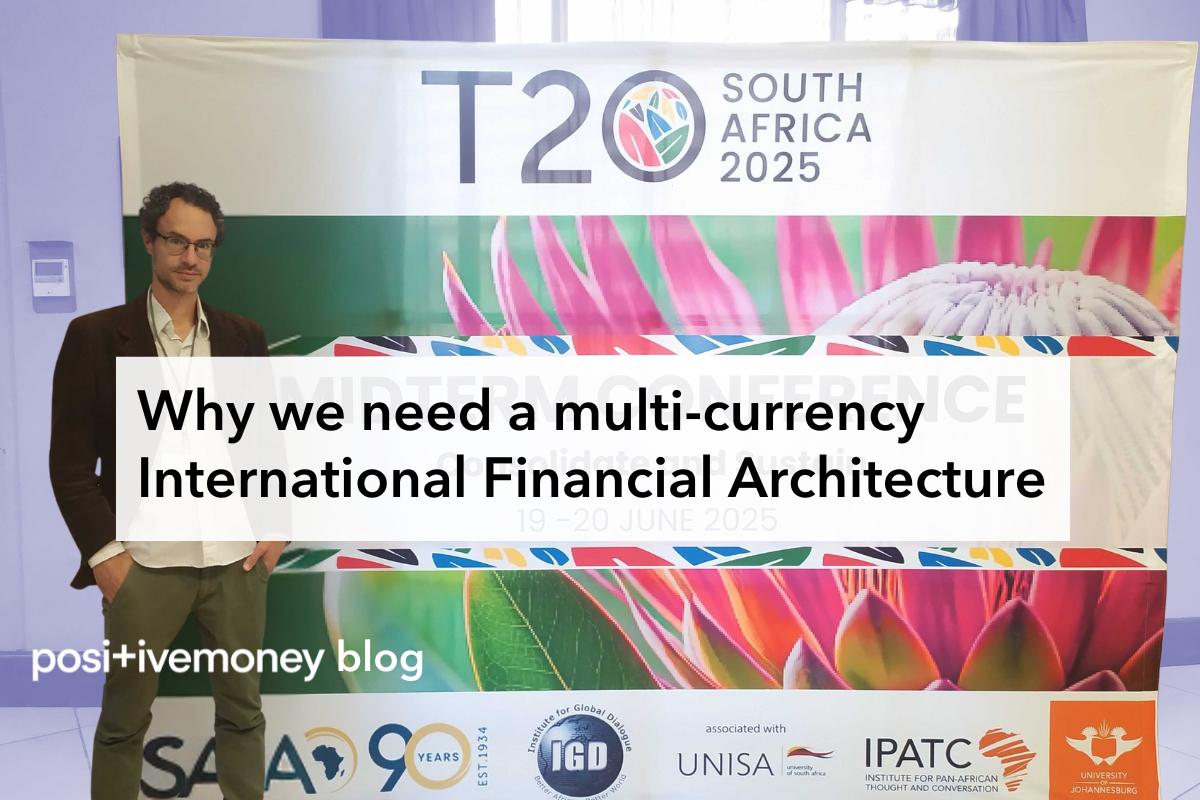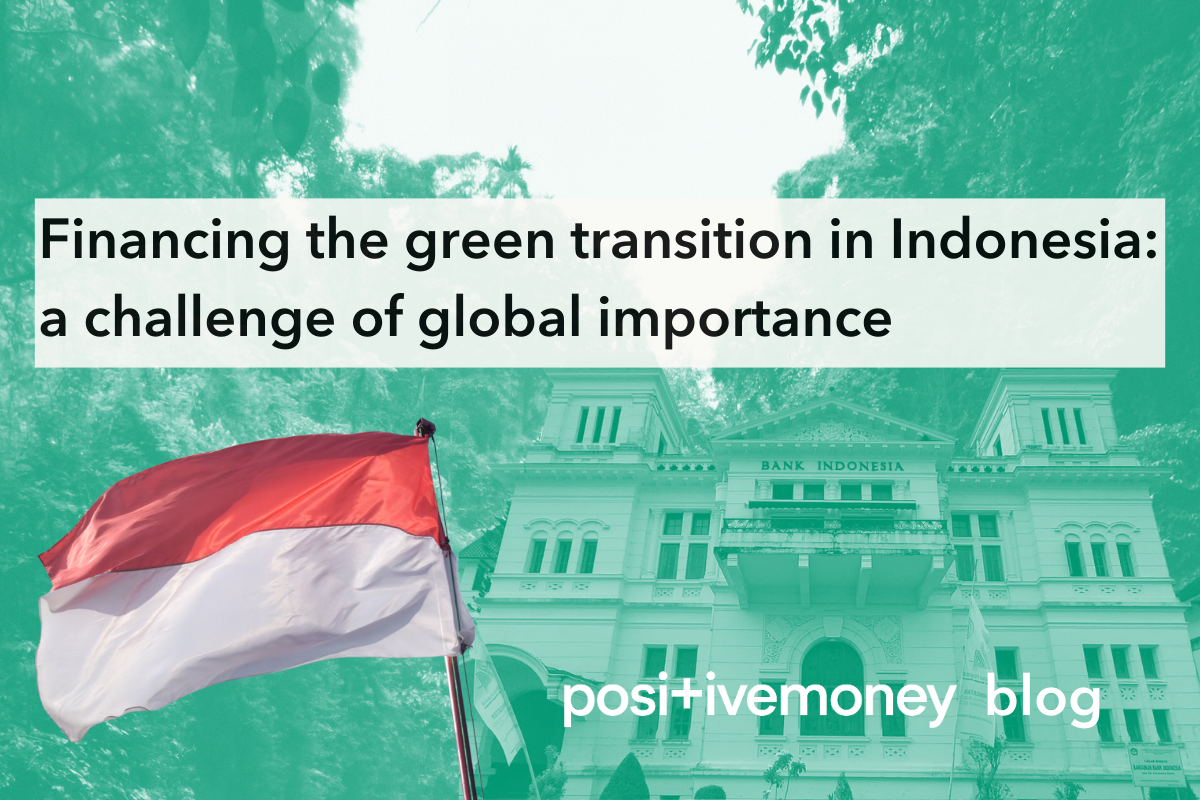
EUUK
3 July 2025
Indonesia is a major global player in terms of both fossil fuel production and biodiversity. The path it takes in the coming years will therefore have huge implications worldwide. This article is part of a series exploring green central banking in East Asian countries.
With over 280 million people, and GDP of $1.4 trillion, Indonesia is the most populous country and largest economy in The Association of Southeast Asian Nations (ASEAN). In 2017, the Indonesian government conducted analysis which led them to predict that the country would become the world’s fourth largest economy by 2045, which would match its current global ranking in terms of population size.
Indonesia is therefore a country whose global economic influence is almost certainly set to grow in the coming years and decades. In addition, it is one of the world’s most biodiverse countries, classed as a ‘megadiverse’ country due to the vast number of different plant and animal species it contains. For these reasons, Indonesia’s approach to the escalating climate and ecological crisis will carry huge significance, and should be of international interest.
Along with Japan and Republic of Korea, Indonesia is one of the East Asian members of the G20, meaning its green central banking policies have been analysed in our Green Central Banking Scorecard. In the 2024 edition, Indonesia ranked towards the middle of the pack, in 9th position. Continuing our blog series on green central banking in East Asian countries, this article explores green finance developments in Indonesia through a focus on three key policy areas: green sukuk, macroprudential incentives for green lending, and green taxonomies. To be clear, these policy areas extend beyond the central bank, and so Indonesia’s national government and microprudential regulatory body are also touched upon.
An interesting place to start is one of Indonesia’s more unique and innovative green finance initiatives: green sukuk. Sukuk are an Islamic financial instrument which are thought of as similar to bonds, yet with operational differences in order to comply with Sharia law. A purchaser of sukuk - instead of receiving interest payments, as with bonds - gains partial ownership of an asset which the issuer uses the funds to invest in. The sukuk purchaser then receives a share of any profits derived from this asset. In this sense, sukuk also have similarities with equity, yet any income stream ends when the issuer ultimately buys back the sukuk in the future.
In March 2018, the Indonesian government issued the world’s first sovereign green sukuk, with all funds raised being invested into green projects. As of 2023, Indonesia was still the world’s largest issuer of green sukuk, with a cumulative total issuance value of USD6.9 billion. As well as purchasing and holding these government green sukuk, Bank Indonesia - the country’s central bank - has itself issued the sukuk Bank Indonesia (SukBI), whose proceeds are allocated to purchasing green government sukuk.
Notably, in December 2022, a bill passed through Indonesia’s parliament which enabled Bank Indonesia to purchase bonds directly from the government. This contrasts with many other countries, where central banks are only able to purchase sovereign bonds on the secondary market. While Bank Indonesia has sustainability linked bonds as part of its reserves portfolio, it is not clear the extent to which it has directly purchased bonds and sukuk focused on environmental sustainability from the national government. Nonetheless, having the capacity to do so presents a huge opportunity for the central bank and national government to collaborate on driving forward investment in Indonesia’s green transition.
A second green finance initiative in Indonesia worth looking at is the development of macroprudential policies to stimulate green lending. Bank Indonesia states on its website that “macroprudential incentives are offered by Bank Indonesia to banks extending loans/financing to priority and green sectors”. One example is the reduction of reserve requirements associated with bank lending for mortgages for housing of a high environmental standard, and for electric vehicle ownership. Further, as of 2020, Bank Indonesia enabled banks to make these loans without the requirement of a downpayment.
In our 2024 Green Central Banking Scorecard, Indonesia gained points for this initiative, with green lending schemes being one of the report’s recommendations. However, there are significant shortfalls which are holding back these macroprudential incentives from becoming what we refer to as a ‘high impact’ policy (which score the largest number of points in the Scorecard). Namely, Bank Indonesia has applied reduced reserve requirements not just to green lending, but also to lending for heavily-polluting activities, including across the mining, agricultural, and transportation sectors, which undermines any environmental benefits of the policy.
In addition, the type of lending being incentivised is targeted towards the consumption side of the economy, which is insufficient to meet the scale of the ecological crisis the world is facing. Beyond incentivising consumption changes, central banks must guide finance towards green transformation of the productive structures of the economy, most importantly through shifting investment away from fossil fuels and into renewable energy production. This is particularly pressing in Indonesia, which is one of the largest coal producers in the world.
A third and final area of green finance in Indonesia that this article will look at is taxonomies. The Otoritas Jasa Keuangan (OJK) - in English, the Financial Services Authority - is responsible for microprudential regulation of Indonesia’s financial services sector; a function which was transferred over from Bank Indonesia in 2013. In 2021, the OJK published the Sustainable Finance Roadmap Phase II (2021-2025), which set out an aim “to increase the understanding and capacity of financial services sector actors to move towards a low-carbon economy”. One of the strategic priorities set out by the Roadmap was the development of a taxonomy to define green investment.
In February 2024, the OJK issued the Taxonomy for Sustainable Finance in Indonesia (TKBI), which builds on the earlier Indonesian Green Taxonomy Edition 1.0, in order to provide a classification of economic sectors that support Indonesia's Sustainable Development Goals (SDGs). Positively, the TKBI expands out the prior taxonomy’s focus on the energy sector - specifically, on transition to net zero emissions - to consider a wider range of environmental objectives including biodiversity protection and transition to a circular economy. In addition, the TKBI is designed to operate in tandem with the Association of Southeast Asian Nations’ (ASEAN) Taxonomy for Sustainable Finance (ATSF).
The TKBI classifies activities into three categories: green, transitional, and those that don’t meet the standard to be either green or transitional. This is where the problems start. Within the TKBI, coal fired power plants are classified as a transitional activity if they are producing power for the mining or processing of minerals deemed necessary for renewable energy transition. Sending a signal that investment in new coal fired power plants can be part of a sustainable energy transition is entirely contradictory, and undermines the supposed value of green taxonomies.
It is positive to see efforts in Indonesia to develop green finance through the design of schemes and instruments adapted to its national cultural context, e.g. green sukuk. On top of this, the signs of collaboration between Bank Indonesia and the national government - around green sukuk, for example - aligns with one of the recommendations in the 2024 Scorecard, which calls for such collaboration to increase green public investment.
Also echoing recommendations of the Scorecard, are Bank Indonesia’s creation of incentives for green lending, and recognition of supply-side drivers of inflation including fossil fuels and extreme weather events. The OJK’s publication of Guidelines for Banking Climate Risk Stress Testing (CRST) and the Climate Risk Management & Scenario Analysis (CRMS) is also a positive step.
Having said this, it is notable that in the 2024 Scorecard, Indonesia registered no ‘high-impact’ policies. By our definition, for a policy to qualify as high-impact, it must actively divert finance away from the most polluting sectors, e.g. fossil fuels. This is therefore a clear space into which Indonesia can progress.
For example, Indonesia must adapt its policies around green lending in order to clearly set this on more favourable terms than lending to high-polluting sectors. One way to achieve this is through dual interest rates, in which lending for green activities is offered at a lower rate than that for high-carbon activities. Commercial banks can also be subjected to increased capital requirements for lending to high-carbon activities e.g. through a ‘dirty penalising factor’. Such schemes can be backed up by the development of rigorous and credible taxonomies, in which fossil fuel production must be classified as a ‘dirty’ activity; another step Indonesia should take
At the G20 summit in November 2024, Indonesian President, Prabowo Subianto, declared a commitment to phasing out all fossil-fueled power generation in the country by 2050. It is important to restate that, as a major fossil fuel producer, one of the world’s richest areas of biodiversity, and a country that was subjected to centuries of European colonialism - namely by the Netherlands - Indonesia must be supported in its green transition by international financial arrangements. The cost for this financial support must be borne particularly by countries with the highest cumulative emissions, and those that have benefitted - historically, and in the present - from the colonial exploitation of other countries.
This article is part of our ongoing series exploring green central banking in East Asia.
Sign-up to our mailing list for regular updates, or donate to support our work to redesign our economic system for social justice and a liveable planet.
